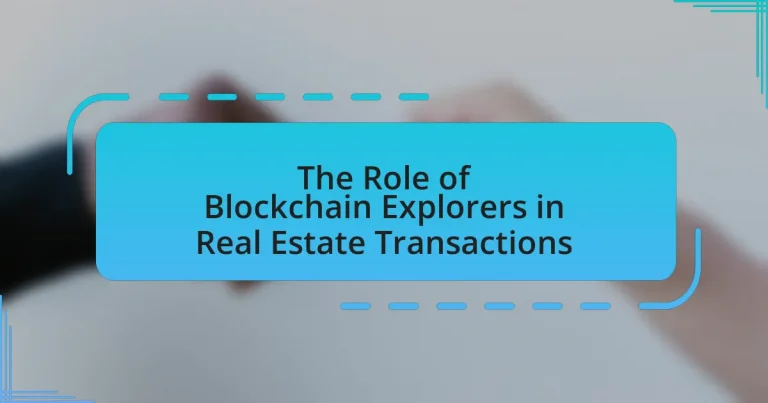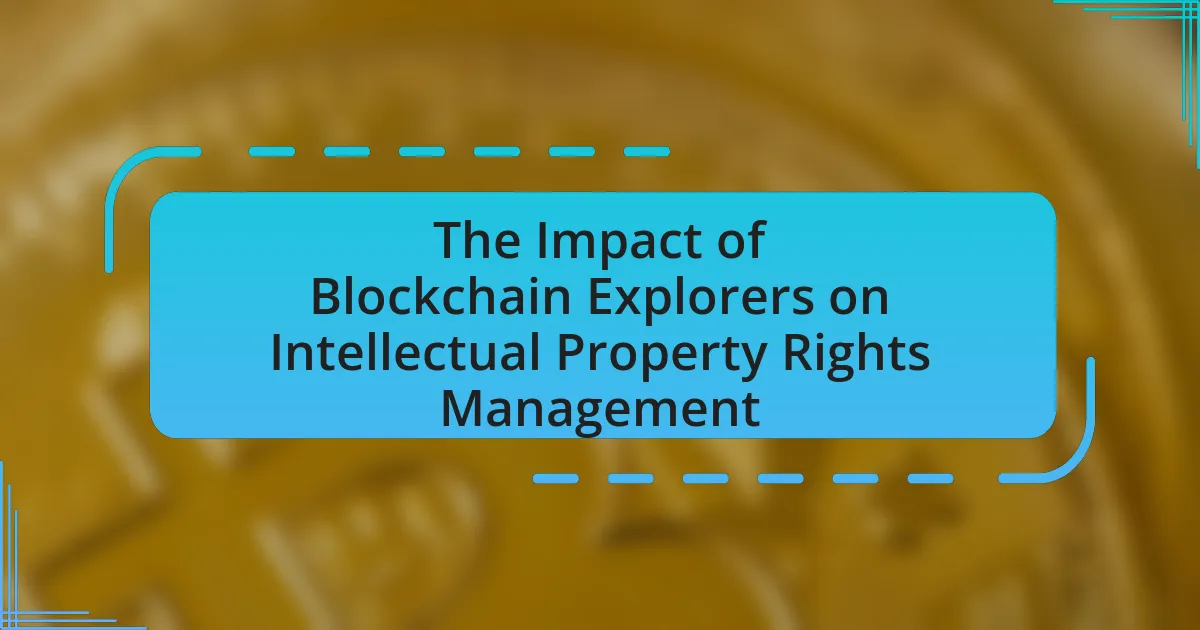Blockchain explorers are critical tools in real estate transactions, providing transparency and traceability of property ownership and transaction history. They enable users to verify property titles, track transaction histories, and ensure the authenticity of documents, thereby reducing the risk of fraud and disputes. Key features include transaction transparency, ownership verification, and historical data access, which enhance trust and efficiency in the sector. However, challenges such as regulatory compliance, data privacy, and technological limitations persist. The article explores the functionality, importance, and future trends of blockchain explorers in real estate, emphasizing their role in facilitating due diligence and improving transaction speed and efficiency.
What is the role of blockchain explorers in real estate transactions?
Blockchain explorers serve as essential tools in real estate transactions by providing transparency and traceability of property ownership and transaction history. They allow users to access and verify the details of property titles recorded on the blockchain, ensuring that all transactions are immutable and publicly accessible. This transparency reduces the risk of fraud and disputes, as all parties can independently verify ownership and transaction details. Furthermore, blockchain explorers facilitate the auditing process by enabling stakeholders to track changes in property ownership over time, thus enhancing trust in the transaction process.
How do blockchain explorers function within the real estate sector?
Blockchain explorers function in the real estate sector by providing transparent access to transaction data recorded on a blockchain. They allow users to verify property ownership, track transaction history, and ensure the authenticity of documents related to real estate transactions. For instance, blockchain explorers can display details such as the date of transactions, involved parties, and any liens or encumbrances on a property, which enhances trust and reduces fraud. This functionality is supported by the immutable nature of blockchain technology, where each transaction is securely recorded and publicly accessible, ensuring that all stakeholders can independently verify the information.
What are the key features of blockchain explorers relevant to real estate?
The key features of blockchain explorers relevant to real estate include transaction transparency, property ownership verification, and historical data access. Transaction transparency allows users to view all transactions on the blockchain, ensuring that all parties can verify the legitimacy of property transfers. Property ownership verification is facilitated by the ability to trace ownership history through the blockchain, which reduces the risk of fraud. Historical data access enables stakeholders to review past transactions and ownership records, providing essential context for current property valuations and legal considerations. These features collectively enhance trust and efficiency in real estate transactions.
How do blockchain explorers enhance transparency in real estate transactions?
Blockchain explorers enhance transparency in real estate transactions by providing a public ledger that records all transaction details in an immutable format. This allows stakeholders, including buyers, sellers, and regulators, to verify ownership, transaction history, and property details without relying on intermediaries. For instance, each transaction is timestamped and linked to a unique block, making it easy to trace the history of a property. This level of accessibility and verification reduces the risk of fraud and disputes, as all parties can independently confirm the authenticity of the information.
Why are blockchain explorers important for real estate professionals?
Blockchain explorers are important for real estate professionals because they provide transparent access to transaction data on the blockchain. This transparency allows real estate professionals to verify property ownership, track transaction history, and ensure the authenticity of documents associated with real estate transactions. For instance, by using a blockchain explorer, professionals can confirm that a property title has not been altered or disputed, thereby reducing the risk of fraud. Additionally, the immutable nature of blockchain records enhances trust among parties involved in real estate transactions, facilitating smoother and more secure dealings.
How do they facilitate due diligence in property transactions?
Blockchain explorers facilitate due diligence in property transactions by providing transparent access to transaction histories and ownership records. They enable stakeholders to verify property titles, track previous ownership changes, and confirm the authenticity of transactions through immutable records stored on the blockchain. This transparency reduces the risk of fraud and disputes, as all relevant information is publicly accessible and can be audited in real-time. Additionally, blockchain explorers often include timestamps and cryptographic proofs, which further enhance the reliability of the data, ensuring that all parties involved can trust the information presented during the due diligence process.
What impact do they have on transaction speed and efficiency?
Blockchain explorers significantly enhance transaction speed and efficiency in real estate transactions by providing real-time access to transaction data and status. This immediate visibility allows stakeholders to track the progress of transactions, reducing the time spent on inquiries and follow-ups. According to a study by the World Economic Forum, blockchain technology can reduce transaction times from weeks to minutes, thereby streamlining processes and minimizing delays. Furthermore, the transparency offered by blockchain explorers helps to eliminate redundancies and errors, further improving overall efficiency in real estate transactions.
What challenges do blockchain explorers face in real estate transactions?
Blockchain explorers face several challenges in real estate transactions, primarily related to data transparency, regulatory compliance, and user accessibility. The complexity of real estate transactions often involves multiple stakeholders, which can lead to difficulties in ensuring that all parties have access to the same accurate and up-to-date information. Additionally, the lack of standardized regulations across jurisdictions complicates the integration of blockchain technology into existing legal frameworks, making it challenging for explorers to navigate compliance issues. Furthermore, the technical knowledge required to effectively use blockchain explorers can limit accessibility for non-technical users, hindering widespread adoption in the real estate sector.
How do regulatory issues affect the use of blockchain explorers?
Regulatory issues significantly impact the use of blockchain explorers by imposing compliance requirements that can limit their functionality and accessibility. For instance, regulations may necessitate that blockchain explorers implement Know Your Customer (KYC) and Anti-Money Laundering (AML) protocols, which can hinder user anonymity and the open nature of blockchain data. Furthermore, jurisdictions may have varying laws regarding data privacy and the use of blockchain technology, leading to inconsistencies in how explorers operate across different regions. This regulatory landscape can create barriers for users seeking to access and analyze blockchain data, particularly in real estate transactions where transparency and compliance are critical.
What are the current legal frameworks governing blockchain in real estate?
The current legal frameworks governing blockchain in real estate primarily include regulations related to property rights, securities laws, anti-money laundering (AML) requirements, and data protection laws. In the United States, for instance, the Uniform Law Commission has proposed the Uniform Electronic Transactions Act (UETA) and the Revised Uniform Law on Notarial Acts (RULONA), which facilitate electronic signatures and notarization, thereby supporting blockchain transactions. Additionally, the Securities and Exchange Commission (SEC) regulates tokenized real estate offerings under securities laws, ensuring compliance with investor protection standards. Furthermore, the Financial Crimes Enforcement Network (FinCEN) mandates AML compliance for blockchain-based transactions, which impacts real estate dealings. These frameworks collectively establish a legal foundation for the integration of blockchain technology in real estate transactions, ensuring legitimacy and security.
How can real estate professionals navigate these regulatory challenges?
Real estate professionals can navigate regulatory challenges by leveraging blockchain technology to enhance transparency and compliance. Blockchain provides a decentralized ledger that records transactions securely, making it easier for professionals to track property ownership and verify legal documents. This technology can streamline the due diligence process, reduce fraud, and ensure adherence to regulations by providing immutable records. For instance, jurisdictions that have adopted blockchain for property transactions have reported increased efficiency and reduced costs associated with traditional methods.
What technological limitations exist for blockchain explorers in real estate?
Blockchain explorers in real estate face several technological limitations, including scalability issues, data privacy concerns, and interoperability challenges. Scalability is a significant limitation, as many blockchain networks struggle to handle a high volume of transactions efficiently, which can lead to delays in real estate transactions. Data privacy is another concern, as blockchain’s transparent nature can expose sensitive information about property ownership and transaction details, potentially violating privacy regulations. Additionally, interoperability between different blockchain platforms is limited, making it difficult for explorers to aggregate and analyze data across various systems, which is essential for comprehensive real estate insights. These limitations hinder the full potential of blockchain explorers in facilitating seamless real estate transactions.
How does data accuracy impact the effectiveness of blockchain explorers?
Data accuracy significantly impacts the effectiveness of blockchain explorers by ensuring reliable access to transaction information and asset ownership records. When data is accurate, blockchain explorers can provide users with trustworthy insights into transaction histories, which is crucial for verifying property ownership and transaction legitimacy in real estate. For instance, inaccurate data can lead to misinformation about property titles, potentially resulting in legal disputes or financial losses. Accurate data also enhances user confidence in the blockchain system, as evidenced by studies showing that reliable data increases user engagement and trust in blockchain applications.
What are the potential security risks associated with blockchain explorers?
Blockchain explorers can pose several security risks, primarily due to their public accessibility and the sensitive information they can reveal. These platforms allow users to view transaction histories and wallet addresses, which can lead to privacy breaches if individuals’ financial activities are exposed. For instance, if a user’s wallet address is linked to their identity, malicious actors can track their transactions and potentially target them for theft or fraud. Additionally, blockchain explorers can be susceptible to phishing attacks, where users may be misled into providing personal information or private keys through counterfeit sites that mimic legitimate explorers. The risk of misinformation is also present, as inaccurate data displayed on these platforms can lead to erroneous conclusions about transactions or asset ownership.
How can blockchain explorers be effectively utilized in real estate transactions?
Blockchain explorers can be effectively utilized in real estate transactions by providing transparent access to property ownership records and transaction histories. These tools allow buyers, sellers, and real estate professionals to verify the authenticity of property titles and track the chain of ownership, which reduces the risk of fraud. For instance, blockchain explorers can display immutable records of past transactions, ensuring that all parties have access to the same verified information. This transparency fosters trust among stakeholders and streamlines the due diligence process, ultimately facilitating smoother transactions.
What best practices should real estate professionals follow when using blockchain explorers?
Real estate professionals should prioritize accuracy and security when using blockchain explorers. They must verify transaction details, such as ownership and transfer history, to ensure the legitimacy of property titles. Additionally, professionals should familiarize themselves with the specific blockchain being used, as different blockchains may have unique features and transaction processes. Utilizing reputable blockchain explorers that provide comprehensive data and analytics is essential for informed decision-making. Furthermore, maintaining privacy and confidentiality during transactions is crucial, as blockchain data is publicly accessible. By adhering to these best practices, real estate professionals can enhance their operational efficiency and mitigate risks associated with blockchain transactions.
How can training and education improve the use of blockchain explorers?
Training and education can significantly enhance the use of blockchain explorers by equipping users with the necessary skills to navigate and interpret blockchain data effectively. By providing structured learning on blockchain technology, users can understand how to access transaction histories, wallet balances, and smart contract details, which are crucial for real estate transactions. Research indicates that informed users are more likely to utilize blockchain explorers efficiently, leading to increased transparency and trust in property dealings. For instance, a study by the World Economic Forum highlights that education in blockchain can reduce errors in transaction verification, thereby streamlining processes in real estate.
What tools and resources are available to enhance the use of blockchain explorers?
Blockchain explorers can be enhanced through various tools and resources such as APIs, data analytics platforms, and educational materials. APIs, like those provided by Etherscan or BlockCypher, allow developers to integrate blockchain data into applications, facilitating real-time access to transaction information. Data analytics platforms, such as Glassnode and Dune Analytics, offer insights into blockchain metrics, enabling users to analyze trends and patterns. Additionally, educational resources, including online courses and documentation, help users understand blockchain technology and effectively utilize explorers for real estate transactions. These tools collectively improve the functionality and usability of blockchain explorers, making them more effective for users in the real estate sector.
What future trends can we expect for blockchain explorers in real estate?
Future trends for blockchain explorers in real estate include enhanced transparency, improved transaction efficiency, and increased integration with smart contracts. As blockchain technology matures, explorers will provide real-time access to property records, enabling buyers and sellers to verify ownership and transaction history seamlessly. Additionally, the use of smart contracts will automate processes such as escrow and title transfers, reducing the need for intermediaries and expediting transactions. According to a report by Deloitte, the adoption of blockchain in real estate could streamline processes by up to 30%, highlighting the potential for significant efficiency gains.
How might advancements in technology influence blockchain explorers?
Advancements in technology will enhance blockchain explorers by improving their efficiency, user interface, and data analytics capabilities. For instance, the integration of artificial intelligence can enable more sophisticated data analysis, allowing users to extract insights from blockchain transactions more effectively. Additionally, advancements in cloud computing can facilitate faster data retrieval and processing, making blockchain explorers more responsive and user-friendly. Enhanced security protocols, driven by technological innovations, will also bolster the integrity of the data presented by blockchain explorers, ensuring that users can trust the information they access. These improvements will ultimately lead to a more robust and accessible tool for tracking real estate transactions on the blockchain.
What role will blockchain explorers play in the evolution of real estate transactions?
Blockchain explorers will facilitate transparency and efficiency in real estate transactions by providing real-time access to transaction data on the blockchain. These tools allow users to verify ownership, track property history, and confirm transaction details without intermediaries, thereby reducing the risk of fraud. For instance, as of 2023, platforms like Etherscan and Blockchair have demonstrated how blockchain explorers can enhance trust in digital asset transactions by offering detailed insights into transaction records. This capability is crucial in real estate, where verifying property titles and transaction authenticity is essential for buyers and sellers.
What practical tips can enhance the use of blockchain explorers in real estate?
To enhance the use of blockchain explorers in real estate, users should focus on familiarizing themselves with the specific features of the explorer, such as transaction history, wallet addresses, and block details. Understanding these features allows users to track property transactions accurately and verify ownership. Additionally, utilizing advanced search functions can streamline the process of finding relevant data, such as filtering by transaction type or date, which is crucial for due diligence in real estate transactions. Regularly checking for updates and new features on the blockchain explorer can also improve efficiency, as many platforms continuously enhance their tools to provide better insights and analytics.



